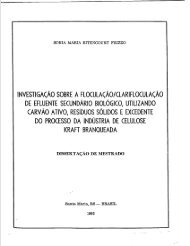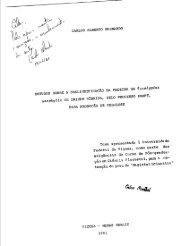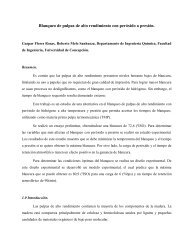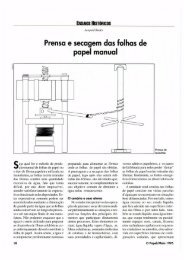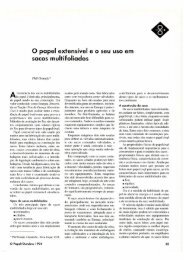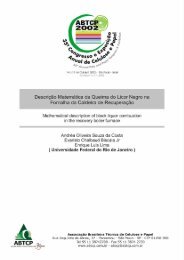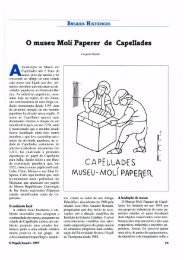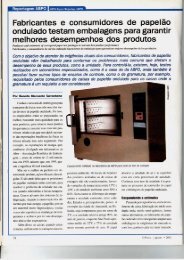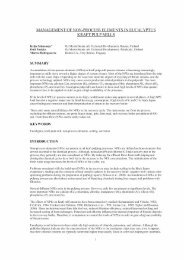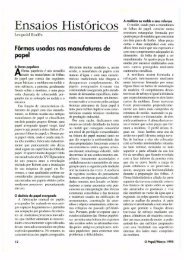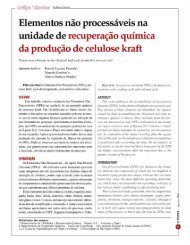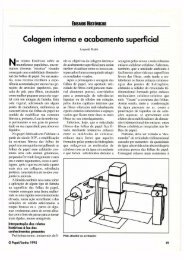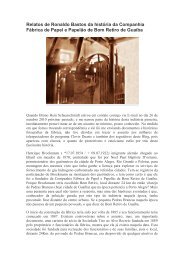O Eucalipto: um século no Brasil (The Eucalypt - Celso Foelkel
O Eucalipto: um século no Brasil (The Eucalypt - Celso Foelkel
O Eucalipto: um século no Brasil (The Eucalypt - Celso Foelkel
You also want an ePaper? Increase the reach of your titles
YUMPU automatically turns print PDFs into web optimized ePapers that Google loves.
No seu livro “O Problema Florestal <strong>no</strong> <strong>Brasil</strong>”, o pesquisador analisou o clima reinante, na<br />
época, com relação ao eucalipto: “Mais <strong>um</strong>a vez teve a crítica indígena ensejo de mostrar<br />
o seu acrisolado patriotismo ao censurar a empresa paulista por deixar de lado centenas<br />
de essencias florestaes patricias, brasileiras das raízes às folhas, para dar preferencia para<br />
<strong>um</strong>a intrusa, filha de longincuas plagas, e que, <strong>no</strong> seu entender encyclopedico, para nada<br />
valia! Chegamos a recear <strong>um</strong>a lei de expulsão para os eucalyptos e ella teria sido votada,<br />
certamente, se dahi pudessem advir benefícios para as <strong>no</strong>ssas industrias artificiaes”,<br />
afirma Navarro.<br />
Então como agora, o despeito crítico não prevaleceu. Na obra “O <strong>Eucalypt</strong>o” ele defendeu<br />
sua escolha, passou a fazer artigos para os jornais e contou que plantara “o maior número<br />
possível de espécies, com o propósito de experimentá-las com o máximo rigor científico”.<br />
Relatou como era extremamente vagaroso o crescimento de quase todas as árvores nativas,<br />
principalmente as famosas pela qualidade de suas madeiras. Enfatizou que seu trabalho<br />
era para <strong>um</strong>a companhia particular, “que tinha como escopo criar florestas capazes de<br />
fornecerem definidos e determinados produtos” em prazo curto. Concluiu dizendo que<br />
não seria viável nem razoável para quem precisava de madeira “para combustível, estacas,<br />
toras, postes e dormentes, plantar árvores cuja utilização poderia somente ser feita <strong>um</strong><br />
<strong>século</strong> depois”.<br />
A V I S Ã O D E N A V A R R O D E A N D R A D E - T H E V I S I O N O F N A V A R R O D E A N D R A D E<br />
67<br />
Casa de Navarro de Andrade, em Rio Claro/SP.<br />
In his book, titled “O Problema Florestal <strong>no</strong> <strong>Brasil</strong>” (<strong>The</strong> Forest Problem in Brazil), the<br />
researcher analyzed the predominating weather of the time with regards to eucalypt:<br />
“Once again the native criticism attempted to surface its refined patriotism by censoring<br />
the São Paulo company for ig<strong>no</strong>ring hundreds of Brazilian forest species, from<br />
roots to leaves, in favor of an intruder, the daughter of distant plagues and, in their<br />
encyclopedic understanding of things, worthless! We actually feared a bill would be<br />
passed to expel eucalypt, and it would clearly have been voted on if that could result in<br />
benefits for our artificial industries,” said Navarro.<br />
<strong>The</strong>n, as <strong>no</strong>w, the critical resentment did <strong>no</strong>t prevail. In the book “O <strong>Eucalypt</strong>o”, he<br />
defended his choice and started writing articles for the newspapers and said he had<br />
planted “the largest possible amount of species in order to experiment with them under<br />
the strictest scientific criteria.”<br />
He reported on how slowly most native trees grew, especially those that were famed for<br />
the quality of their wood. He emphasized his work was for a private company “whose<br />
scope was to create forests capable of providing certain types of products” on the short<br />
term. He concluded by saying it wasn’t viable or even reasonable for someone who<br />
needed wood “for fuel, piles, logs, posts and sleepers, to plant trees that could only be<br />
used a century later.”




